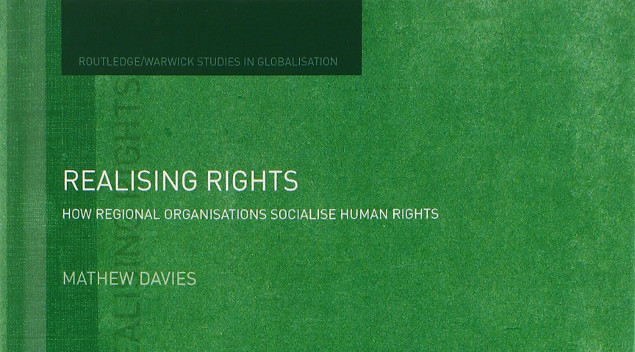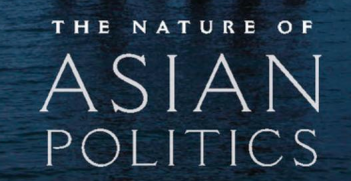Realising Rights: How Regional Organisations Socialise Human Rights

This clearly composed and well written study challenges those interested in the impact of regional organisations in the realisation of human rights to look beyond the case and influence of the European Union. The EU is much discussed for its perceived successes in the cause of human rights realisation and yet, as Davies points out, the EU and its experience are ‘highly atypical. Established and new regional organisations are increasingly important globally and many of them directly institutionalise human rights norms. ASEAN is a case in point, not least because of its transition from human rights scepticism to human rights engagement (if not realisation). ASEAN now has an intergovernmental Human Rights Commission (2009) and its own Bill of Rights (2012); ‘Asian Values’, it seems, have come to some accommodation with the language and institutional form of the global rights regime. Those wondering how this accommodation will play out won’t find the scholarly literature on rights socialisation much help, suggests Davies, because of its EU-centricity.
In many regions of the world, organisations use membership status to effect rights socialisation goals, with mixed results – stories which he notes are untold and rarely studied in the literature. This is a problem not merely because it is an obvious knowledge gap; it is a problem because the particulars of the EU experience generate a theoretical model of norm socialisation, which is generalised, to all cases: the rational choice conceptual model. By looking at cases other than the EU, Davies demonstrates that this model has limited application. He also demonstrates that we can develop a broader, more inclusive and more nuanced model by drawing from a broader field of cases.
Accordingly, Davies considers ASEAN and the Organisation of American States (OAS) as well as the EU. These are chosen because they are organisations where rights socialisation has been important both before and after membership is granted; they also spread over a spectrum of organisational sophistication and norm specification. Of particular importance here is the way in which Davies’s approach takes into account ‘fuzzy’ cases. As he says, ‘a truth of socialisation efforts’ is ‘that it is rare that those efforts centre on a clearly expressed and commonly understood standard.’ The EU, with its clearly defined and highly specified expectations, differs enormously from many other efforts where standards which may be ‘weak and general’ in initial iterations can deepen and become more substantive over time. This must be factored into our conceptual model for how global rights socialisation functions.
In order to do this, Davies first develops a comparative framework for the EU, ASEAN and the OAS. Three forms of rights socialisation processes emerge. The EU model, against which Davies’s study is positioned, is one where ‘the socialisation is achieved as the prerequisite of becoming a member.’ In addition to this conditionality process of socialisation, Davies identifies a ‘Discursive Engagement’ process, which spans the before and after of membership and a ‘Social Influence’ process, which he locates in the post-membership period. These different processes are linked with different socialisation mechanisms and theoretical frameworks: bargaining and persuasion with rational choice and constructivism respectively.
Davies’s chosen regional organisations are discussed with respect to particular cases of attempted socialisation: ASEAN with Myanmar, the OAS with Panama and the EU with Turkey. The first gives mixed messages about the role of ASEAN. While Davies wants to argue that ASEAN made efforts to socialise Myanmar, he ultimately concedes that the efforts failed and that ASEAN’s ‘15 year journey to human rights’ has left much unchanged in regional affairs. Davies’s second case is chosen to show how such weak commitments and outcomes might become something deeper and more authoritative: ‘Early OAS commitments to human rights were broad and imprecise… however, the trajectory of organisation-building has resulted in stronger commitments.’ Davies also uses the changing meanings of membership in the OAS for Panama to feed into his conceptual arguments about socialisation. Finally, Davies turns to the EU and Turkey, where the focus is on membership conditionality and in particular, on its difficulties.
Indeed, much of the book is a discussion of regional failure to socialise human rights norms; despite this, Davies argues that the regional level is perhaps one of the most important for coming to terms with human rights standards. It is a crucial intermediary level between global institutional architectures and state and civil society actors and it is a level at which the pressures of economic competition and political management are most porous. Understanding how human rights function at this level is crucial and Davies’s argument for a more pluralistic conceptual model for realising rights than that given by the prevailing EU-centric literature is compelling.
Mathew Davies, Realising Rights: How Regional Organisations Socialise Human Rights, London: Routledge, 2015.
Anthony J. Langlois is an Associate Professor at Flinders University, South Australia. His areas of academic endeavour include International Relations, Human Rights, Global Justice, International Political Theory, Political Philosophy and Ethics.





